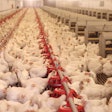The National Chicken Council has called for a full, one-year waiver of the 2013 Renewal Fuel Standard requirement, saying that a recent study has shown such a move could reduce corn prices by $2.00 per bushel.
The estimate comes from an August 2012 report prepared for the Farm Foundation by three Purdue University economists that evaluated how an Environmental Protection Agency waiver of the ethanol mandate would affect the corn and ethanol markets. The council also delivered almost 10,000 individual comments from those whose livelihoods depend on the chicken industry, almost three-quarters of which came from chicken farmers. “Our comments prove in detail that the RFS is causing severe economic harm to the U.S. economy, and the 2013 requirement must be waived in full,” said council President Mike Brown.
A decrease in the price of corn by $2.00 per bushel would alleviate pressures on both consumers at the grocery store and the food, livestock and feed industries, said the council in its statement to the Environmental Protection Agency. Given the important role of corn in U.S. food production, as the price of corn decreases, so do the prices of meat, poultry and dairy products, and the foods that contain corn-based sweeteners, starches, flours and oils, as well as substitute products such as wheat and soybeans and any foods made using them. A marginal decrease in corn price of 24 percent, based on a reduction in the price of corn by $2.00 per bushel, would result in a decrease of approximately 2.4 percent in retail food prices.
More significantly, said the council, a decrease of $2.00 in the price of corn per bushel is equivalent to a decrease of $71.43 per ton of corn, which results in feed costs that are $32.14 to 47.86 lower per ton. The broiler industry uses 1.25 billion bushels of corn each year. Savings of $2 per bushel of corn would amount to $2.5 billion in annual savings to the chicken industry. “Because of the importance of corn in so many aspects of food production, the entire food industry — and ultimately, the consumer — are suffering because of the RFS.”












